Trump Tones Down Anti-Iran Rhetoric In Wake Of Saudi Attack
As the Saudis continue to evaluate the impact of the weekend attack on a major oil facility, the Trump Administration tones down the anti-Iran rhetoric just a bit.
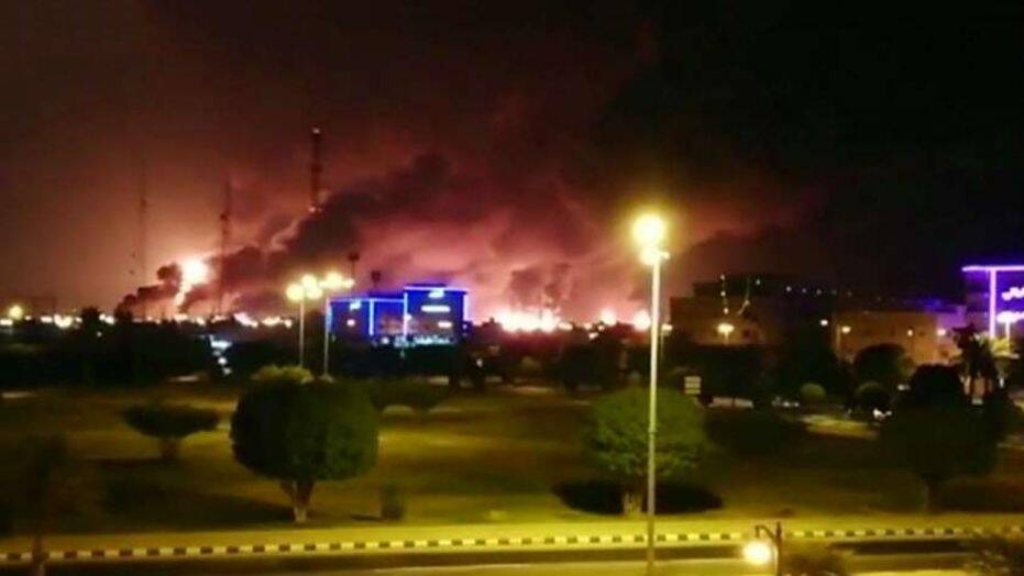
Just a day after appearing to send a message to Iran that it could face retaliation for the weekend attack on a Saudi Arabian oil facility, President Trump appears to be backing away from the hot button rhetoric and is stopping short of directly blaming Iran for the attack:
President Trump said Monday that Iran appeared to have been responsible for the weekend attack on Saudi Arabian oil facilities. But he also said he would “like to avoid” a military conflict with Tehran, emphasized his interest in diplomacy and played down the attack’s jolt to the global oil market.
Asked at the White House whether Iran was behind the strikes on Saturday that crippled much of Saudi Arabia’s oil output, Mr. Trump said, “It’s looking that way.” But he stopped short of a definitive confirmation, adding, “That’s being checked out right now.”
The attack was the most destructive blow to Saudi Arabia since it began waging war in Yemen more than four years ago. The damage inside Saudi Arabia helped drive world oil prices up by 10 percent on Monday, the fastest rise in more than a decade.
Mr. Trump warned that the United States has fearsome military capabilities and is prepared for war if necessary. “With all that being said, we’d certainly like to avoid it,” he said. “I know they want to make a deal,” he said of Iranian officials, whom he has been trying to draw into talks over their nuclear program and other issues. “At some point it will work out.”
Mr. Trump’s comments represented a notable shift in tone from the day before, when he wrote on Twitter that the United States was “locked and loaded,” ready to take action based on Saudi Arabia’s needs.
On Monday, he told reporters he had not “promised” to protect the Saudis. Rather, Mr. Trump said, he will “sit down with the Saudis and work something out.”The president’s statements came shortly after Saudi Arabia, Iran’s principal rival in the region, said Iranian weapons had been used in the attack. But while the Saudis said they would “forcefully respond to these aggressions,” they also stopped short of directly blaming Iran and did not call for immediate retaliation.
The comments from Mr. Trump and the Saudis suggested they did not want the episode to escalate into a wider conflict, just a week before world leaders converge at the United Nations for the General Assembly. Mr. Trump had proposed meeting with Iran’s president, Hassan Rouhani, possibly at the annual gathering in New York, although Iran ruled that out on Monday.
Responsibility for the attack was claimed by the Houthi insurgents in Yemen, who have been fighting a calamitous civil war against a Saudi-led military coalition. Iran is a chief ally of the Houthis.
American officials directly blamed Iran over the weekend for the blows to the Saudi oil facilities. They presented satellite photographs of the damage, contending that the images indicated that the attack had come from the north or northwest — in the direction of Iran or Iraq — not from Yemen, which is to the south. The Saudis also said Monday that their initial investigation showed that the attack had not come from Yemen.
But an analysis of the images by independent experts challenged those assertions.
The images did suggest a complex, precise attack that far exceeded any capabilities the Houthis had previously shown, raising the likelihood of Iran’s involvement.
Still, experts said the images were insufficient to prove where the attack came from, which weapons were used and who fired them.
Iran has denied any involvement in the strike, which threatened to disrupt the global flow of oil.
But Mr. Trump sought to play down the impact on oil prices. “They haven’t risen very much, and we have the strategic oil reserves, which are massive,” he told reporters. By releasing some of those reserves, he said, “you’d bring it right down.”
This new report comes at the same time that The Washington Post reports that Pentagon officials are urging restraint in response to the attack:
Pentagon officials on Monday recommended a restrained response to the recent attacks on Saudi oil facilities, arguing against a potentially costly conflict with Iran, which the administration has blamed for the strike on a key American ally, according to officials familiar with Defense Department deliberations.
Defense Secretary Mark T. Esper met with President Trump and key national security officials at the White House on Monday, two days after a series of explosions crippled two oil facilities in Saudi Arabia, disrupting more than half the Sunni kingdom’s oil supply and dramatically escalating tensions with its chief rival, Shiite power Iran.
While Yemen’s Houthi rebels have claimed responsibility for the attacks, Trump administration officials have said they believe that at least the bulk of the strikes, which targeted two facilities belonging to state-run Saudi oil firm Aramco, were launched from within Iran — an allegation that, if true, would represent a major escalation between the Middle East’s leading regional powers.
In a message posted on Twitter, Esper, who took over at the Pentagon in the midst of a previous confrontation with Iran in June, said the U.S. military and other government agencies were “working with our partners to address this unprecedented attack and defend the international rules-based order that is being undermined by Iran.”
But military officials are also privately urging caution, seeking to defuse tensions they believe could push the United States into a possibly bloody conflict with Iran at a time when the Pentagon is seeking to wind down insurgent wars in the Middle East and reorient toward competition with China.The officials, who spoke on the condition of anonymity to describe their views, sought to emphasize the fact that no American personnel or facilities had been targeted in the weekend attacks, suggesting that a direct U.S. military response might not be merited. They also said that, if such a move was deemed necessary, the administration would need to find a valid legal basis to take action.
Pentagon officials have also stressed the risks to the at least 70,000 U.S. personnel stationed under U.S. Central Command, which stretches from Egypt to Pakistan, if tensions with Iran spin out of control.
Defense officials have repeatedly raised similar concerns as the Trump administration has embraced a hawkish policy toward Iran over the past 18 months, including the president’s decision to withdraw from his predecessor’s nuclear deal with Tehran and to impose harsh new sanctions on Iran and its affiliates.
It’s worth noting that the Houthi rebels continue to claim responsibility for the attack, but the consensus from U.S, and international officials find that claim to be doubtful at best. The first reason for this is the fact that, while the Houthis have used drones in battle before this they have not committed the kind of coordinated, highly sophisticated, and obviously well-planned attacked like the one that occurred on Saturday. According to some reports, the attack Additionally, while the Houthis have attacked Saudi Arabian territory before, those targets have generally been closer to the Saudi-Yemeni border and typically been against targets related to the Saudi military and the Saudi war on Yemen. This attack occurred some 900 miles away from the Yemeni border and was against a civilian target. Additionally, there are some reports that state that there’s evidence that the drones approached the facility from the north or northeast, which suggests a launch site in either that portion of Iraq controlled by pro-Iranian Shiite militias or from Iran itself. In that same regard, there was a report of a drone over sensitive parts of Kuwait City on Saturday at roughly the same time the attack was taking place in Saudi Arabia. Given all of this, the suspicion that the attack originated from somewhere other than Yemen and that it was launched by someone other than the Houthis is well-founded.
Needless to say, how this all plays out over the next several days and weeks is significantly important. As it stands, all sides seem to be interested in keeping the rhetoric toned down so that neither side is dragged into a conflict that would most likely not be limited to retaliation but instead would threaten to spread out across the Persian Gulf region and potentially erupt into a wider war. Quite obviously this would not be in the interest of the United States and it would potentially throw the entire world economy into a downward spiral due to its inevitable impact on world oil prices. That’s why it’s crucial that the response to this incident be measured and well thought out. Unfortunately, we’ve got a leader in the White House who is not noted for either of those things.
In any case, this could very well become the first real foreign policy crisis that President Trump has faced. I’m most emphatically not confident of his ability to handle it well.

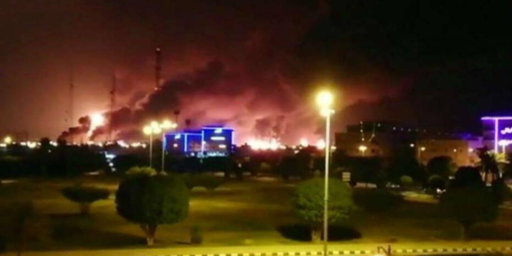

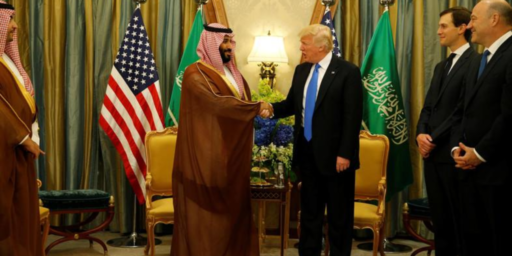
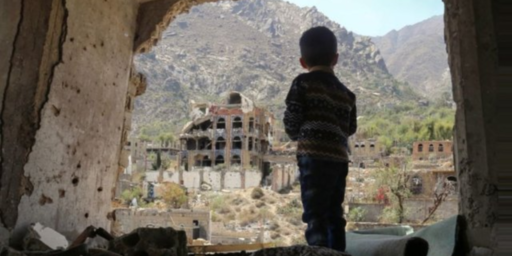
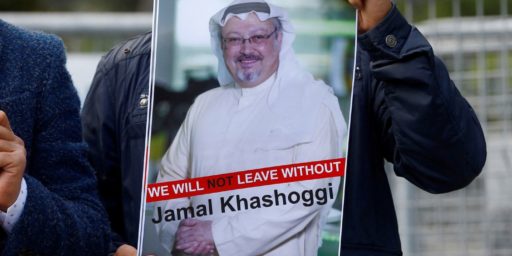
Bolton is gone, so I see Iran getting pretty much the same agreement that Trump had previously torn up (shades of NAFTA), with the US coming out of it slightly diminished (shades of North Korea). Toss in several contradictory tweets and wash down with the next bright new scandal. Even if that didn’t play to the man’s instincts, he’s got to realize that any war will tank the global economy along with his chances at re-election (and of remaining a free man). To the extent that he can concentrate on anything, I think he will concentrate on this. The wild card is Iran, along with any other player who realizes that they’ve got the great negotiator by the balls. I’d be grabbing the popcorn were I not already kchoking on the stuff after these past few years.
Again, I could be 110% wrong about this, but again, this fits into a general pattern of behavior with Trump. Leads with really aggressive talk and then takes absolutely no action.
All that said, the fewer Boltons around him, the better. But for all his big talk, his tendency to date has been to avoid direct military conflict*. I can only hope that continues.
* – Again, the big “but” here is the way that he’s increased our use of drone strikes while decreasing transparency over those strikes. So it isn’t all good.
The proof that the Houthis didn’t do this is evidently that they have never done it before? That’s some prime deep-inside-the-box thinking. How many times did Al Qaeda fly a jet into a skyscraper before 9-11?
We need to understand that we no longer have a CIA, no intelligence agency at all. So long as Trump has his Sharpie and the entire Republican Party and all its apparatchiks have auto-castrated, we have exactly zero reason to believe anything that comes from US intel, and God knows we can’t take MBS or Netanyahu at their words. So what information can we rely on to make rational decisions?
France. I’ll listen to French intel. If the DGSE tells me it was Iran, OK, maybe. But the US government cannot be trusted. At all. If Trump says Iran is attacking Alabama the toadies will eagerly regurgitate his lies. Trust no one associated with Trump, anyone still belonging to the Republican Party, or anyone in the executive chain of command.
@mattbernius:
You know “chickenhawk” means someone who supports military action while they avoid, or avoided, military service?
Dennison is a chicken-chickenhawk. He threatens to support military action, but then chickens out.
Those images of the damage showing that the Houthi could not have launched this attack sound interesting. We should present them to the world. Maybe Colin Powell could show them at the UN.
The US has used military means to further our political goals scores of times. It could be said that, “Shoot first, ask questions later” is the guiding principle of our actions. This is true no matter who sits in the White House. We will undertake offensive armed ventures against Iran when our calculations make that useful.
Our culture demands this. “Chicken” is a deadly insult.
@michael reynolds: My thoughts now on this are it is wiser to stay out of this mess. For one thing who are the players and what is their game? If I get into a poker game I like to know something about the players. We now have enough oil so that is not a problem as in the past.* Not our game. England was in the Middle East long ago and seemed to handle things reasonably well some of the time. Of course they had General Allenby, General Montgomery, and Colonel Lawrence.
Who knows what will happen if Iran attacks Israel.
*The gas “shortage” of 1973 was a hoax. Once they got the price up we had plenty of gas.
Some governor has already warned the stores about price gouging.
If the Saudi’s are so aggrieved that they need to enact a reprisal then by all means MBS, launch your attack. It would cause a major war, perhaps WWIII, but if other countries stayed out of the fray, Iran would overrun the Saudi’s in a few weeks.
The Saudi’s aren’t our friends, so we have no dog in this fight.
@mattbernius:
There is nothing that could be done, because the Iranians/houthis could strike again and then you’d have another increase in the price of oil, what would be a blow to the Saudi economy and could cause a recession in the US.
There are two countries whose leadership wants a war between the US and Iran: Saudi Arabia and Israel.
Both clearly could and would do this.
Trump’s the kind of bully who likes to talk tough and instigate fights then back down while calling the guy who stood up to him a wimp. Typical rich kid. Privileged kid. Daddy got him whatever he wanted, except for love. And since he’s loud and had money he got away with his transparently bogus tough guy act.
One of the reasons I have such contempt for Republicans is that not only did they bend over and stick their greased butts in the air, they did it for such a weak-ass loser as Trump. They let themselves be bullied by a pussy.
@michael reynolds: Yeah. Republicans like to make a big deal out of “character matters”, which it does. But they are such lousy judges of character.